

Moratorium (law) A moratorium is a delay or suspension of an activity or a law.
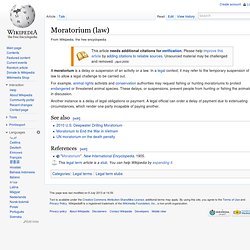
In a legal context, it may refer to the temporary suspension of a law to allow a legal challenge to be carried out. For example, animal rights activists and conservation authorities may request fishing or hunting moratoriums to protect endangered or threatened animal species. These delays, or suspensions, prevent people from hunting or fishing the animals in discussion. Another instance is a delay of legal obligations or payment. A legal official can order a delay of payment due to extenuating circumstances, which render one party incapable of paying another. "Moratorium". Miranda warning. The Miranda warning, also referred to as Miranda rights or Miranda rule, is a warning given by police in the United States to criminal suspects in police custody (or in a custodial interrogation) before they are interrogated to preserve the admissibility of their statements against them in criminal proceedings.
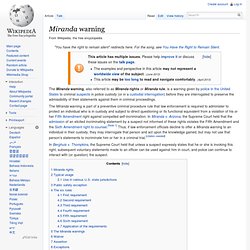
The Miranda warning is part of a preventive criminal procedure rule that law enforcement is required to administer to protect an individual who is in custody and subject to direct questioning or its functional equivalent from a violation of his or her Fifth Amendment right against compelled self-incrimination. In Miranda v. Arizona, the Supreme Court held that the admission of an elicited incriminating statement by a suspect not informed of these rights violates the Fifth Amendment and the Sixth Amendment right to counsel.
In Berghuis v. Indictment. An indictment (/ɪnˈdaɪtmənt/), in the common law system, is a formal accusation that a person has committed a crime.
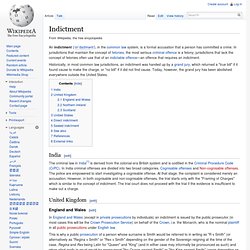
In jurisdictions that maintain the concept of felonies, the most serious criminal offence is a felony; jurisdictions that lack the concept of felonies often use that of an indictable offence—an offence that requires an indictment. Historically, in most common law jurisdictions, an indictment was handed up by a grand jury, which returned a "true bill" if it found cause to make the charge, or "no bill" if it did not find cause.
Today, however, the grand jury has been abolished everywhere outside the United States. India[edit] United Kingdom[edit] England and Wales[edit] In England and Wales (except in private prosecutions by individuals) an indictment is issued by the public prosecutor (in most cases this will be the Crown Prosecution Service) on behalf of the Crown, i.e. the Monarch, who is the nominal plaintiff in all public prosecutions under English law. Bequest. (From Old English becwethan, to declare or express in words; cf.
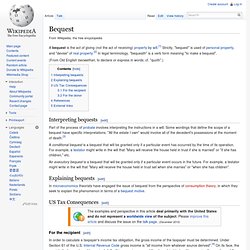
"quoth".) Interpreting bequests[edit] Part of the process of probate involves interpreting the instructions in a will. Some wordings that define the scope of a bequest have specific interpretations. "All the estate I own" would involve all of the decedent's possessions at the moment of death.[3] A conditional bequest is a bequest that will be granted only if a particular event has occurred by the time of its operation. An executory bequest is a bequest that will be granted only if a particular event occurs in the future. Explaining bequests[edit] In microeconomics theorists have engaged the issue of bequest from the perspective of consumption theory, in which they seek to explain the phenomenon in terms of a bequest motive. US Tax Consequences[edit] For the recipient[edit] In order to calculate a taxpayer's income tax obligation, the gross income of the taxpayer must be determined.
Chaplain. Rabbi Ralph Kreger, BCC with a patient's family member at Lenox Hill Hospital (part of the North Shore LIJ health system) Types of chaplains[edit] Military[edit] Military chaplains provide pastoral, spiritual and emotional support for service personnel, including the conduct of religious services at sea, on bases or in the field.
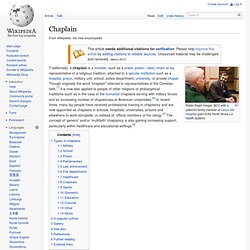
Military chaplains have a long history; the first English military-oriented chaplains, for instance, were priests on board proto-naval vessels during the 8th century. Land-based chaplains appeared during the reign of King Edward I. Military chaplains are normally accorded officer status, although Sierra Leone had a Naval Lance Corporal chaplain in 2001. Though the Geneva Conventions does not state whether chaplains may bear arms, they specify (Protocol I, 8 June 1977, Art 43.2) that chaplains are noncombatants. A U.S. The United States European Command has co-sponsored an annual International Military Chiefs of Chaplains Conference every year since 1991.